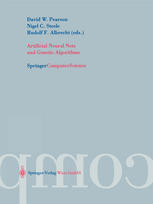

Most ebook files are in PDF format, so you can easily read them using various software such as Foxit Reader or directly on the Google Chrome browser.
Some ebook files are released by publishers in other formats such as .awz, .mobi, .epub, .fb2, etc. You may need to install specific software to read these formats on mobile/PC, such as Calibre.
Please read the tutorial at this link: https://ebookbell.com/faq
We offer FREE conversion to the popular formats you request; however, this may take some time. Therefore, right after payment, please email us, and we will try to provide the service as quickly as possible.
For some exceptional file formats or broken links (if any), please refrain from opening any disputes. Instead, email us first, and we will try to assist within a maximum of 6 hours.
EbookBell Team

0.0
0 reviewsThe 2003 edition of ICANNGA marks a milestone in this conference series, because it is the tenth year of its existence. The series began in 1993 with the inaugural conference at Innsbruck in Austria. At that first conference, the organisers decided to organise a similar scientific meeting every two years. As a result, conferences were organised at Ales in France (1995), Norwich in England (1997), Portoroz in Slovenia (1999) and Prague in the Czech Republic (2001). It is a great honour that the conference is taking place in France for the second time. Each edition of ICANNGA has been special and had its own character. Not only that, participants have been able to sample the life and local culture in five different European coun tries. Originally limited to neural networks and genetic algorithms the conference has broadened its outlook over the past ten years and now includes papers on soft computing and artificial intelligence in general. This is one of the reasons why the reader will find papers on fuzzy logic and various other topics not directly related to neural networks or genetic algorithms included in these proceedings. We have, however, kept the same name, "International Conference on Artificial Neural Networks and Genetic Algorithms". All of the papers were sorted into one of six principal categories: neural network theory, neural network applications, genetic algorithm and evolutionary computation theory, genetic algorithm and evolutionary computation applications, fuzzy and soft computing theory, fuzzy and soft computing applications.